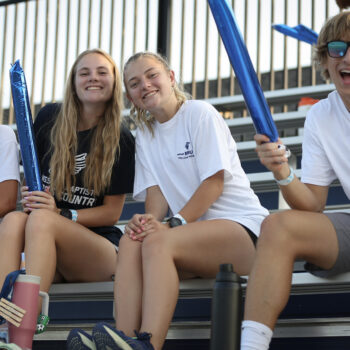MBU is dedicated to opening as safely as possible this fall. Below are protocols and procedures that have been set in place by the University to navigate the upcoming school year.
PERSONAL PROTECTIVE EQUIPMENT (PPE)
Mask Requirements: Missouri Baptist University is making the following adjustments to its COVID-19 policies beginning with the spring 2022 semester:
- Face coverings during MBU’s weekly chapel will be optional.
- The University will no longer require students or employees to complete the health self assessment form on the Spartan Safe App. MBU community members should continue to use the Spartan Safe App for contract tracing in the case of a suspected or confirmed COVID-19 exposure.
MBU’s COVID-19 Action Team will continue to daily review data and trends related to the coronavirus and make modifications that keep the well-being of our MBU community paramount.
- Some people are unable to wear a face covering due to lung or other health-related conditions. Students, please contact the Dean of Students Office (DeanofStudents@mobap.edu) or faculty/staff contact the Provost Office (Provost@mobap.edu) if you are unable to wear a face covering for these reasons and need an accommodation. Medical documentation will be requested as the University works to provide the accommodation through an interactive process.
CLEANING AND DISINFECTION PROTOCOL
- Housekeeping staff will clean common areas and workspaces based on CDC guidelines for disinfection.
- Disinfecting supplies have been placed in public spaces (including athletic facilities and computer labs), and cleaning is required before and after individual use.
- When working in offices, building occupants should wipe down commonly used surfaces before and after use with products provided by or approved by Campus Operations staff. This includes any shared-space locations or equipment (copiers, printers, computers, A/V or other electrical equipment, kitchen appliances, desks, tables, light switches, door knobs, etc.).
- Electrostatic sprayers are used for electrostatic sanitizing in all residence halls and locker rooms.
SYMPTOM MONITORING AND TEMPERATURE PROTOCOL
- Do not attend class or report to work if you are experiencing symptoms unless you have already consulted a health care provider (e.g. allergy symptoms), and if you develop symptoms during the day, return to your home or room. In this case, faculty will set up reasonable alternative arrangements for student learning.
HANDWASHING, HAND SANITIZING AND GLOVE USE
- Wash your hands often with soap and water for at least 20 seconds, especially after you have been in a public place or after blowing your nose, coughing, sneezing or touching your face. If soap and water are not readily available, use a hand sanitizer that contains at least 60% alcohol. Hand sanitizer is available to each department.
- Food handling, health care activities and other high-risk areas should use gloves, but according to the CDC, gloves are not necessary for general use and do not replace good hand hygiene. Hand washing is the most effective way to prevent spread.
PHYSICAL DISTANCING GUIDELINES
- Keeping space between people is one of the best tools to avoid exposure to COVID-19 and slowing its spread because people may be able to spread the virus before knowing they are sick. Physical distancing is important for everyone, especially to protect people who are at high risk for health complications.
HEALTH SCREENING, TESTING & TREATMENT OPTIONS
- If an individual begins to feel sick after completing the daily health screening before coming to campus, the individual should take the daily health screening and take action as appropriate.
- The University partners with the Mercy Hospital to establish resources specifically for MBU students including telehealth visits, dedicated transition of care, and access to hospitals.
REPORTING A COVID-19 POTENTIAL CASE
For individuals who:
1) have experienced signs and symptoms that may be related to COVID-19 identified in the University’s daily Health Screening,
2) have received information that they were in close or direct contact with someone who has received a positive COVID-19 test result or
3) received a positive COVID-19 test result from a medical provider.
Please:
- Complete the COVID-19 Tracing Report Form with as much details as you can recall, which will help the University take steps for you and the University community to maintain a healthy and safe environment.
- Follow the CDC Isolation and Quarantine Information
- The University Contact Tracing Team will contact you with additional information and how to receive approval to return to campus.
QUARANTINE AND ISOLATION
Please review CDC Protocols for Isolation and Quarantine. These protocols are continuously changing and the CDC website providers the most up to date information. Faculty, staff, or students who are experiencing symptoms as outlined by the CDC should follow the below protocols.
What counts as close contact?
- You were within 6 feet of someone who has COVID-19 for at least 15 minutes
- You provided care at home to someone who is sick with COVID-19
- You had direct physical contact with the person (touched, hugged, or kissed them)
- You shared eating or drinking utensils
- They sneezed, coughed, or somehow got respiratory droplets on you
Steps to Take - Faculty, staff, and students who do not reside on campus should stay home until symptom-free, or until they have contacted a health provider to rule out COVID-19, either by test or another condition (e.g. allergies, other illness, testing negative for COVID-19, etc.).
- Faculty and staff may work remotely where possible upon the approval of their supervisor and absences should be reported through the COVID-19 Contact Tracing Form.
Students in isolation on campus should:
- Separate from other residents as quickly as possible. Individuals with minor symptoms will be asked to self-isolate. Students with more severe symptoms may be tested for COVID-19 and temporarily relocated to alternate housing.
- Complete the COVID-19 Contact Tracing Form immediately.
- Notify Residence Life if they believe they may have contracted COVID-19.
POSITIVE COVID-19 TEST AND ISOLATION PROCEDURE:
If a faculty or staff member contracts COVID-19, they will complete the COVID-19 Tracing Form immediately.
- Follow CDC Isolation and Quarantine Website
- The University Contact Tracing Team will conduct contact tracing and connect the individual to appropriate resources related to sick leave and health care options. Faculty and staff will work with a medical professional to care for their health and quarantine in their home, and will not return to work until cleared by a qualified health professional. The COVID-19 Contact Tracing Team will conduct contact tracing and work with the appropriate public health department to ensure anyone who has been exposed is notified of isolation precautions.
• Ending Isolation (CDC Guidance): Faculty, staff, students and visitors must follow CDC guidelines to end isolation.
Notification of Health Officials and Contact Tracing: In accordance with applicable federal, state and local laws and regulations, MBU will notify health officials at St. Louis County Department of Public Health of faculty, staff and students immediately of any case of COVID-19 while maintaining confidentiality in accordance with the Americans with Disabilities Act (ADA) and FERPA. MBU will work with St. Louis County Department of Public Health to inform those who have had close contact with a person diagnosed with COVID-19 to stay home or in their living quarters and self-monitor for symptoms, and follow CDC guidance if symptoms develop.

